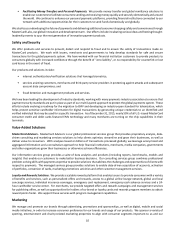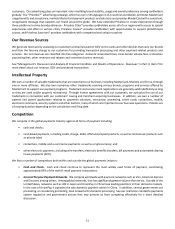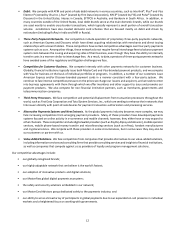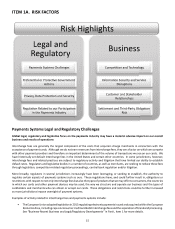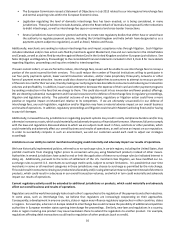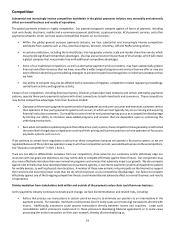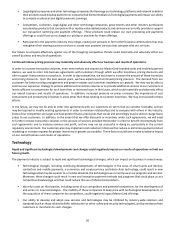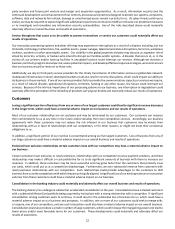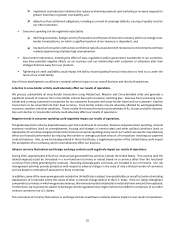MasterCard 2015 Annual Report Download - page 26
Download and view the complete annual report
Please find page 26 of the 2015 MasterCard annual report below. You can navigate through the pages in the report by either clicking on the pages listed below, or by using the keyword search tool below to find specific information within the annual report.20
• Large digital companies and other technology companies that leverage our technology, platforms and network to deliver
their products could develop platforms or networks that disintermediate us from digital payments and impact our ability
to compete as physical and digital payments converge.
• Competitors, customers, large digital and other technology companies, governments and other industry participants
may develop products that compete with or replace value-added products and services we currently provide to support
our transaction switching and payment offerings. These products could replace our own processing and payments
offerings or could force us to change our pricing or practices for these offerings.
• Participants in the payments industry may merge, create joint ventures or form other business combinations that may
strengthen their existing business services or create new payment services that compete with our services.
Our failure to compete effectively against any of the foregoing competitive threats could materially and adversely affect our
overall business and results of operations.
Continued intense pricing pressure may materially and adversely affect our business and results of operations.
In order to increase transaction volumes, enter new markets and expand our MasterCard-branded cards and enabled payment
devices, we seek to enter into business agreements with customers through which we offer incentives, pricing discounts and
other support that promote our products. In order to stay competitive, we may have to increase the amount of these incentives
and pricing discounts. Over the past several years, we have experienced continued pricing pressure. The demand from our
customers for better pricing arrangements and greater rebates and incentives moderates our growth. We may not be able to
continue our expansion strategy to process additional transaction volumes or to provide additional services to our customers at
levels sufficient to compensate for such lower fees or increased costs in the future, which could materially and adversely affect
our overall business and results of operations. In addition, increased pressure on prices increases the importance of cost
containment and productivity initiatives in areas other than those relating to customer incentives. We may not succeed in these
efforts.
In the future, we may not be able to enter into agreements with our customers on terms that we consider favorable, and we
may be required to modify existing agreements in order to maintain relationships and to compete with others in the industry.
Some of our competitors are larger and have greater financial resources than we do and accordingly may be able to charge lower
prices to our customers. In addition, to the extent that we offer discounts or incentives under such agreements, we will need
to further increase transaction volumes or the amount of services provided thereunder in order to benefit incrementally from
such agreements and to increase revenue and profit, and we may not be successful in doing so, particularly in the current
regulatory environment. Our customers also may implement cost reduction initiatives that reduce or eliminate payment product
marketing or increase requests for greater incentives or greater cost stability. These factors could have a material adverse impact
on our overall business and results of operations.
Technology
Rapid and significant technological developments and changes could negatively impact our results of operations or limit our
future growth.
The payments industry is subject to rapid and significant technological changes, which can impact our business in several ways:
• Technological changes, including continuing developments of technologies in the areas of smart cards and devices,
contactless and mobile payments, e-commerce and cryptocurrency and block chain technology, could result in new
technologies that may be superior to, or render obsolete, the technologies we currently use in our programs and services.
Moreover, these changes could result in new and innovative payment methods and programs that could place us at a
competitive disadvantage and that could reduce the use of MasterCard products.
• We rely in part on third parties, including some of our competitors and potential competitors, for the development of
and access to new technologies. The inability of these companies to keep pace with technological developments, or
the acquisition of these companies by competitors, could negatively impact MasterCard offerings.
• Our ability to develop and adopt new services and technologies may be inhibited by industry-wide solutions and
standards (such as those related to EMV, tokenization or other safety and security technologies), and by resistance from
customers or merchants to such changes.


